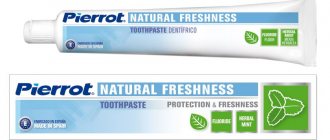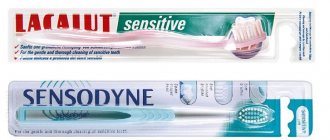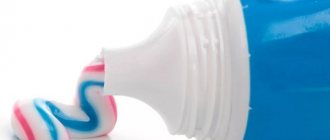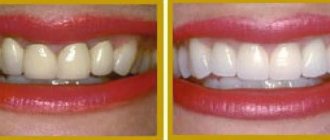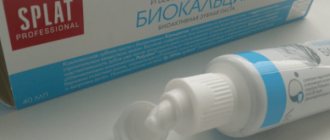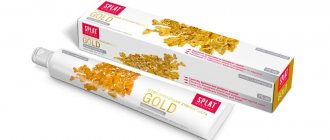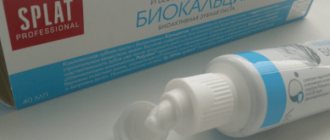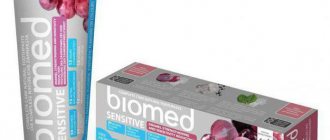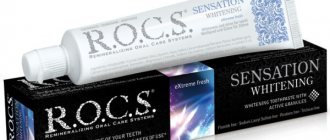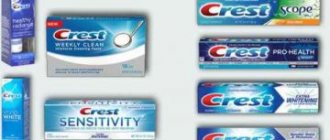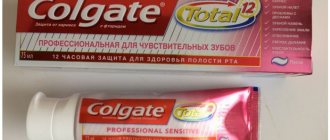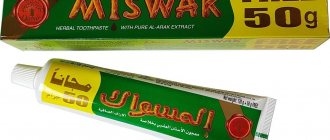- Types of toothpastes
- Properties of toothpastes
- Composition of toothpastes
- Choosing toothpaste according to problem
How many of us buy toothpaste? They make a shopping list and go to the hypermarket. If this sounds like you, then most likely you underestimate the role of toothpaste in your health. A good toothpaste protects against caries, ensures that teeth do not lose minerals, and most importantly, does not harm the enamel. In this article, we will analyze in detail the compositions of modern pastes and tell you how to choose the one that really suits you.
Why is calcium used in toothpaste?
The basis of bones and hard tooth tissues consists of calcium. He is responsible for their strength. During nutrition, an acidic environment is created in the oral cavity, which destroys calcium compounds. If the substance does not enter the body in the required quantity, over time, foci of demineralization appear, tooth enamel becomes thin and sensitive, and as a result, caries appears. Without proper care, hard tissues become fragile. Under mechanical loads, pieces may break off from them.
To avoid negative manifestations, use specialized personal hygiene products. They replenish the mineral composition of the enamel, eliminate hypersensitivity and protect the surface from caries. When used in a timely manner, drugs not only have a preventive effect, but also treat diseases in the initial stages.
Chemical substance, biochemical processes
In addition to water, natural sources of fluoride are fish, apples, and tea. fluorine acts as an inhibitor in many foods, affects the metabolism of fats and carbohydrates, and is involved in the formation of teeth and bones. But at the same time, we must not forget that the same fluorine is a chemical substance of the second hazard class. Fluoros in Greek means destroyer. Fluorine gas F2 is lethal to humans. No other element has a physiologically required amount so close to the dose that produces a toxic effect. Under the influence of excess fluoride in the body, an imbalance of phosphorus-calcium metabolism occurs, which leads to disturbances in the mineralization of bone tissue and ligaments.
Colloid degeneration of thyroid tissue
Scientists - fluorine causes colloidal degeneration of thyroid tissue, reduces immunity, inhibits intracellular synthesis processes and accelerates physiological aging. According to a study published in the journal Behavioral Brain Research, fluoride can cause changes in brain tissue similar to Alzheimer's disease and some other forms of dementia. And to continue this sad list... have you ever seen warning notices hanging in pharmacies or stores selling fluoride-containing toothpaste?
If fluoride can really help our teeth, then only in microdoses. It is desirable that this element enters our body exactly in the quantity in which we are able to absorb fish, apples, tea and mineral water.
Fluoride toothpaste? By the way, about water. Even if you prefer tap water to mineral water, do not think that you can safely use fluoride toothpastes. In the sixties, many other countries followed America's example; the side effects of water fluoridation were discovered; most of these countries abandoned such experiments on their citizens. In Germany, fluoridation of water is expressly prohibited, since it is the same as prescribing the same medicine to everyone and forcing them to take it, regardless of the possible consequences. We can say that water is now fluoridated only in America and Ireland. But even there there are fighters against forced fluoridation of the population.
Dentists simply do not know how dangerous water fluoridation is. They do not know that the fluoride used for this is obtained from toxic waste containing lead and arsenic. Mac Auley claims that the truth is being hidden from the Irish; there has never been any research done into the effects of drinking fluoridated water. As for Russia, we have both territories with a naturally low fluorine content in water, and regions where the amount of fluorine exceeds the norm; water fluoridation is considered a benefit, as a promising direction of development, and this technology is being implemented everywhere. At least in those regions where there is money for this.
Advantages of calcium over fluoride
To restore the mineral composition of enamel, fluoride or calcium is added to toothpastes. The first one has a number of disadvantages:
- Negatively affects health. When choosing fluorine-containing products, you need to pay great attention to the dosage of the active component. An excess can lead to the appearance of fluorosis on the surface of the teeth and a general disruption of the bone structure. That is why the dosage is always indicated on the packaging, which is selected depending on the person’s age and the condition of the enamel.
- Not allowed with fluoridated tap water. In this case, toothpaste containing fluoride leads to an excess of the mineral in the body and causes disease. But this does not mean that you are getting enough minerals from the water. Therefore, they need to be restored in other ways.
Calcium-containing preparations do not have such disadvantages. They are safe and suitable for regular daily use.
Anti-inflammatory substances
Aluminum lactate, triclosan, chlorhexidine, biosol are names that can most often be found in descriptions of pastes that have antimicrobial and anti-inflammatory properties. The effectiveness of these elements is quite high, but it should be understood that, together with pathogenic microflora, they destroy or reduce the activity of beneficial ones. For this reason, their prolonged uncontrolled use may have a negative impact on health in the long term. Such pastes, like all therapeutic and prophylactic pastes, should be used after consultation with a dentist and according to his instructions.
Ideally, therapeutic and prophylactic pastes with additives should be used on the recommendation of a dentist, who will select the appropriate product for each specific case and tell you how and how much to use. In addition, it should be understood that such pastes are not an alternative to professional hygiene, remineralization and lamination at the dentist, but only an effective addition to these procedures.
There are contraindications, you should consult your doctor
Indications for the use of toothpastes with calcium
Specialized products have medicinal properties. Dentists recommend using it when the following diseases occur:
- demineralization of enamel;
- increased sensitivity;
- low resistance of teeth to acid attack;
- caries at the white spot stage;
- chips and scratches on the surface of the teeth;
- tendency to form tartar.
Calcium-containing products are used not only for treatment, but also for the prevention of diseases. If our diet is perfectly balanced, the body receives the required amount of minerals and trace elements. In this case, there is no need to use additional drugs. But few people can boast of a balanced diet. Periodic use of calcium-containing hygiene products helps to avoid negative manifestations.
Rating of toothpastes with calcium for adults
When choosing a hygiene product, it is not enough to make sure that it contains calcium-containing components. A positive effect can only be achieved if they are well absorbed by the body. The following compounds have proven themselves to be excellent in practice:
- pantothenate;
- citrate;
- lactate;
- glycerophosphate.
Sometimes, to give the recipe universal properties, manufacturers add fluorine and calcium at the same time. These components do not fit well together and cannot demonstrate the desired result.
PresiDENT Unique
The hygiene product is designed specifically for use in regions with high fluoride content in water. The active ingredients replenish the lack of minerals in hard tissues and effectively restore them. With regular use, increased sensitivity disappears.
The cleaning agents have a controlled abrasiveness of 75 RDA. This is enough to effectively remove daily plaque. Negative manifestations disappear, and the smile acquires a natural whiteness.
ROCS "Active calcium"
The toothpaste has a low level of abrasiveness. This allows it to be used for the hygiene of weakened teeth with increased sensitivity. At the same time, you do not experience pain.
The active action is based on xylitol. It is a natural component that effectively restores hard tissue. During cleaning, the product neutralizes the acidic environment, which reduces the risk of caries.
Cedar balm “With calcium”
The product does an excellent job of eliminating painful sensations. A complex of cedar oil and lavender has an antiseptic effect. It heals wounds and restores damaged periodontal areas. Lavender imparts bactericidal properties. It prevents the development of pathogenic microorganisms and eliminates bad breath.
Calcium glycerophosphate is used to maintain enamel health. It strengthens sensitive teeth and protects them from caries.
President Unique
To prevent problems from occurring, you need to regularly perform professional oral and dental hygiene in a clinical setting. This is the only way to avoid gingivitis, stomatitis, periodontitis, caries, and damage to the enamel layer. After such procedures, dentists recommend that patients use hygiene products that restore and strengthen the enamel. President Unique is a product of an Italian manufacturer. In addition to papain and hydroxyapatite, it contains aloe extract, as well as vitamin E and spherulites extracted from the juice of Acacia Senegalese. These components gently and carefully clean and brighten the enamel layer of the units. Pros:
- Rapid regeneration of pathological enamel;
- Relieving inflammation, fighting bacteria;
- Prevents the accumulation of dirty plaque and hard stones;
- Beneficial effect on gum tissue;
- Improving blood circulation in the soft tissues of the oral cavity;
The product is successfully used for the treatment and prevention of the initial phase of periodontal disease.
Rating of toothpastes with calcium for children
Dentists do not recommend using calcium-containing products to clean baby teeth. But high levels of fluoride also have a negative impact on health. Therefore, the drugs should be used by adolescents. For children only if there are obvious problems with their teeth.
ROCS kids
Hygienic products have a low abrasiveness. This makes it possible to carefully but effectively care for children's enamel. Calcium glycerophosphate with xylitol strengthens it and prevents the appearance of caries.
Thanks to the presence of linden and chamomile extracts, it is possible to restore periodontal tissue. The composition reduces bleeding and pain, reduces the risk of the appearance and development of gum disease.
Splat Baby
The active formula of the toothpaste includes dicalcium phosphate dihydrate. It destroys plaque with daily cleaning and restores the surface after mechanical impact. The LUCTATOL complex, based on licorice extract, has a special effect. It creates a protective layer on the teeth that prevents the deposition of dirt and the development of diseases.
The effectiveness of the products has been tested in extensive clinical trials. The composition is suitable for children's teeth from birth to three years.
SILCA Putzi
The hygiene product is designed for children from 2 to 12 years old. It has a pleasant taste that makes it appealing to kids. They do not experience negative emotions during the cleaning process and willingly switch to independent hygiene. Moreover, only natural substances are used in the recipe. They are safe even if swallowed.
Low abrasive particles do an excellent job of removing dirt. Calcium-containing substances restore the mineral structure. Vitamin E nourishes the gums.
Anti-caries additives
The most common:
- Calcium glycerophosphate. Calcium salt, designed in toothpastes to compensate for the deficiency of this microelement in dental tissues. It is possible to saturate the enamel in adulthood with the necessary microelements only locally, so brushing teeth with a paste containing calcium glycerophosphate will be many times more effective in this regard than using specialized medications. In addition, the substance activates anabolic processes and strengthens the crystal lattice of the enamel.
- Xylitol. This is a natural sugar substitute, which in addition has properties that are beneficial for teeth and gums. The main benefit is the elimination of bacteria in the oral cavity that are not able to process the substance. As a result, there is a pronounced anti-caries effect (everyone knows that caries appears due to the fault of bacteria that live in large numbers in the human oral cavity). In addition, xylitol helps strengthen enamel and gums, has antifungal activity, enhances salivation and increases the protective properties of saliva.
- Enzymes. The most applicable are mutanase, invertase, peroxidase, protease, carbohydrase. The anti-caries effect is due to the same properties as the previous substance - enzymes fight pathogenic microflora in the mouth. At the same time, they do not damage the mucous membranes, have a beneficial effect on periodontal tissue, dissolve soft plaque and soften hard plaque.
The effectiveness in the fight against incipient caries and the preventive effect of elements from this group are lower than, for example, sodium fluoride, but they do not pose a threat to the body.
Article on the topic
Are yellows better than whites? Seven myths about teeth
Rating of toothpastes with biocalcium
Biocalcium particles are synthesized substances based on natural hydroxyapatite. It completely replicates the mineral structure of enamel, so it copes better than others with the task of restoring damaged tooth surfaces.
DIES "Biocalcium"
Designed for gentle professional whitening and strengthening of enamel. Does an excellent job of cleaning due to the presence of enzymes and abrasives. Papain penetrates deeply into the plaque structure and breaks it down from the inside. After this, abrasive substances remove all dirt. Hydroxyapatite strengthens the surface damaged during cleaning.
The fish oil present in the recipe promotes the rapid absorption of calcium-containing elements.
Splat "Biocalcium"
The active formula of the toothpaste includes calcis, which is obtained from eggshells. In combination with hydroxyapatite, it becomes a building material that can strengthen the natural structure of the tooth. Thanks to the increased concentration of components, it is possible to quickly reduce enamel hypersensitivity.
The product has excellent hygienic properties. Papain softens even hardened plaque deposits. Soft abrasives gently remove them from the surface.
From the history
The mention of the first means for cleaning teeth dates back to the 3rd-5th millennium BC. The ancient Egyptians ground eggshells, pumice, ashes of ox entrails, and myrrh and prepared a product from this, which was the progenitor of tooth powder. The Greeks, Romans and Persians improved the recipe by adding shellfish shells ground into powder, crushed chalk, honey, and dried plants. The Slavs contributed to the development of dentistry by starting to brush their teeth with birch charcoal. Powders and pastes, more or less similar to modern ones, appeared in Great Britain only in the 18th century, when their use was considered the prerogative of the nobility.
Modern people are luckier - everyone can choose a product to suit their taste and budget or for medical reasons. Nowadays there are toothpastes that are not only hygienic, but also therapeutic and prophylactic, which include special additives. Let's look at them in more detail.
Hollywood smile. How to whiten teeth at home? More details
